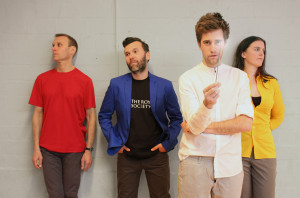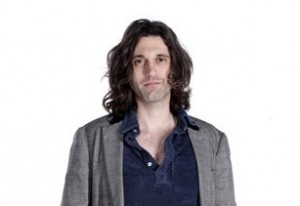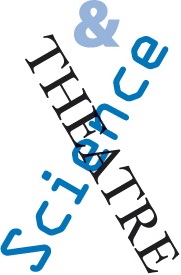by Lucas Hnath
Sex, drugs & science in the 17th century
Watch the video trailer HERE !!
 Isaac Newton wants to become a member of the Royal Society. Catherine wants to start a family.
Isaac Newton wants to become a member of the Royal Society. Catherine wants to start a family.
Robert Hooke wants to know what Newton knows. The guy with the plague wants to stay alive. They conduct a risky experiment.
Afterwards, Newton doesn’t know any more than before but Hooke gets his sex diary back, Catherine’s skepticism is stronger than ever and the guy with the plague is dead.
Science moves in mysterious ways.
Isaac’s Eye mixes the facts of Isaac Newton’s life with an equal dose of fiction to explore what great people are willing to sacrifice to become great people.
It puts the history of science onstage, juxtaposing historical characters and facts with our 21st century based projection of them.
And by the way – it’s the best science comedy out there!
“I tend to write plays about people who are trying to do something that is impossible or nearly impossible. I’m interested in people who are trying to accomplish things that very few people will ever accomplish. … Huge ambition brings with it aspects of wonder, high stakes, and danger. But even more interesting than that, when you combine enormous ambitions with the small conflicts we experience everyday, the ordinary becomes illuminated. There’s a Virginia Woolf quote that I like very much: The paraphernalia of reality have at certain moments to become the veil through which we see infinity. We are neither roused nor puzzled; we do not have to ask ourselves, What does this mean? We feel simply that the thing we are looking at is lit up, and its depths revealed. Conflating the mythic with the miniscule has become my strategy for piercing Woolf’s veil.” Lucas Hnath
 Lucas Hnath is one of the most promising voices in contemporary US theater. His other plays include Death Tax (Humana Fest/Steinberg Award), NightNight, A Public Reading of an Unproduced Screenplay about the Death of Walt Disney (Soho Rep) and Red Speedo (Studio Theatre, Washington DC). A resident playwright at New Dramatists since 2011, Lucas Hnath has enjoyed playwriting residencies with The Royal Court Theatre, London and 24Seven Lab, New York. He is a two-time winner of the Alfred P. Sloan Foundation Grant for his feature-length screenplays, The Painting, the Machine and the Apple and Still Life. He received both his BFA and MFA from NYU’s Department of Dramatic Writing and is a lecturer in NYU’s Expository Writing Program.
Lucas Hnath is one of the most promising voices in contemporary US theater. His other plays include Death Tax (Humana Fest/Steinberg Award), NightNight, A Public Reading of an Unproduced Screenplay about the Death of Walt Disney (Soho Rep) and Red Speedo (Studio Theatre, Washington DC). A resident playwright at New Dramatists since 2011, Lucas Hnath has enjoyed playwriting residencies with The Royal Court Theatre, London and 24Seven Lab, New York. He is a two-time winner of the Alfred P. Sloan Foundation Grant for his feature-length screenplays, The Painting, the Machine and the Apple and Still Life. He received both his BFA and MFA from NYU’s Department of Dramatic Writing and is a lecturer in NYU’s Expository Writing Program.
 Isaac’s Eye is part five of Science&Theatre, a collaboration of English Theatre Berlin | International Performing Arts Center with Prof. Dr. Regine Hengge (Institute for Biology/Microbiology at the Humboldt University Berlin) and her team of young scientists.
Isaac’s Eye is part five of Science&Theatre, a collaboration of English Theatre Berlin | International Performing Arts Center with Prof. Dr. Regine Hengge (Institute for Biology/Microbiology at the Humboldt University Berlin) and her team of young scientists.
Photo Lucas Hnath: Tony Cenicola/The New York Times | Production photo: Magnus Hengge/adhoc
Supported by the Andrea von Braun Stiftung

- Fri, April 25, 2014 | 8pmMain Stage
- with 11 additional performances until May 10th
European Premiere
Lecture by Prof. Friedrich Steinle (Technische Universität Berlin): The Airpump, the Prism, and Other Challenges: What Can We Learn From 17th Century Experiments? / May 7, 2014
Post-performance discussion with Prof. Regine Hengge, Günther Grosser and the cast on April 30, 2014
Written by Lucas Hnath
Directed by Günther Grosser
With Oskar Brown, Ben Maddox, Mary Kelly and Jeffrey Mittleman
Set Design by Tomás Fitzpatrick | Lighting Design by Katri Kuusimäki | Scientific Coordinator: Prof. Dr. Regine Hengge (Humboldt Universität Berlin) | Assistant Director/Stage Manager: Ruby Grosser | Directing Assistant: Annie Womack | Set Assistant: Max Wilhelm | Production Assistant: Demi Nandhra
Links
- Listen to Oskar Brown (Isaac Newton) on rbb radioeins [in German]
- Listen to Scientific Coordinator Prof. Regine Hengge on rbb radioeins [in German]
- Watch the trailer for the production
- Interview with Lucas Hnath (New York Theatre Review, May 2013)
- Interview with Lucas Hnath (New York Times, Feb. 2013)
Lucas Hnaths brillante Komödie über Ambitionen, Licht, Liebe und ein kurioses Experiment
Isaac Newton möchte unbedingt Mitglied der Royal Society werden. Catherine möchte unbedingt eine Familie. Robert Hooke möchte unbedingt wissen, was Newton weiß. Der Pestkranke möchte unbedingt weiterleben. Sie wagen ein riskantes Experiment.
Anschließend ist Newton auch nicht schlauer, aber Hooke hat sein Sextagebuch zurück, Catherines Skeptizismus hat sich bestätigt, und der Pestkranke ist tot.
Die Wissenschaft geht seltsame Wege.
Der große Isaac Newton und der große Robert Hooke waren drei Jahrzehnte lang erbitterte Gegner: Lucas Hnath gibt in seinem neuen Stück Isaac´s Eye dieser Dauerfehde einen fiktiven Anfang während der großen Londoner Pest von 1666, ein Moment, in dem alle Differenzen der beiden und all ihre sozialen Unzulänglichkeiten zu einem kuriosen Experiment zusammenschnurren: Newton versucht, durch die Manipulation des Augapfels mit Hilfe einer durch den Tränenkanal eingeführten Nadel zu beweisen, dass Licht aus Partikeln besteht und nicht, wie Hooke vermutet, aus Wellen. Erst 300 Jahre später sollte sich herausstellen, dass sie beide Recht hatten.
Isaac´s Eye schreibt Wissenschaftsgeschichte auf die etwas andere Weise: Das Stück konfrontiert historische Figuren und Vorgänge mit unseren Projektionen der Geschichte, trennt dabei wahr von falsch, Theoretiker von Praktikern, Eindeutiges vom Schillernden und versucht eine Antwort auf die Frage, was die Heroen der Wissenschaft bereit sind zu opfern, um Heroen zu werden.
Hnaths Versuch, zwei Zeitebenen nahtlos zu verschmelzen und dabei Newtons Theorie zur Struktur des Lichts mit seinen brennenden Ambitionen als junger Wissenschaftler zu verknüpfen, macht Isaac´s Eye zu einem herausfordernden performativen Experiment.
Und nebenbei schrieb Hnath die beste Komödie zur Wissenschaftsgeschichte.
Mit Unterstützung der Andrea von Braun-Stiftung
LUCAS HNATH ist eine der interessantesten Stimmen des jungen US-amerikanischen Theaters. Seine Stücke Death Tax, NightNight , A Public Reading of an Unproduced Screenplay about the Death of Walt Disney und Red Speedo wurden von den bedeutendsten Bühnen der amerikanischen Off-Szene, dem Soho Rep in New York und dem Studio Theatre in Washington produziert. Er war Resident Playwright bei New Dramatists, am Royal Court in London und am 24Seven Lab, New York und wurde zweimal mit dem Drehbuch-Preis der Alfred P. Sloan-Stiftung ausgezeichnet.